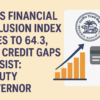
The Reserve Bank of India (RBI) has published a comprehensive Guidance Note on Operational Risk Management and Operational Resilience. This document serves as an updated guideline replacing the previous note issued in 2005. The update incorporates lessons learned from recent years, including the COVID-19 pandemic and subsequent disruptions, as well as technological advances that pose both risks and opportunities for financial institutions.
Key Highlights:
Purpose and Context: The note aims to enhance the effectiveness of operational risk management among regulated entities (REs) in the financial sector, which includes commercial banks, cooperative banks, all-India financial institutions, and non-banking financial companies. It addresses new challenges, including increasing reliance on technology and third-party service providers.
Framework Update: The framework is aligned with the latest principles of the Basel Committee on Banking Supervision (BCBS). It adopts a principle-based approach that allows for proportional implementation based on the size, nature, and complexity of REs.
Three Lines of Defense: The note emphasizes the need for a clear governance structure, assigning distinct roles and responsibilities to business unit management (first line), independent operational risk management (second line), and internal/external audit functions (third line).
Operational Resilience: Recognizing the increased threat landscape, the guidance stresses the importance of resilience in delivering critical operations through disruptions. It provides principles on mapping interdependencies and establishing impact tolerances for critical operations.
Risk Management Processes: The note details the need for comprehensive identification and assessment of operational risks. It recommends tools like self-assessment, event management, scenario analysis, and benchmarking to help REs proactively manage their operational risk profiles.
Third-Party Dependency Management: The guidance underscores the importance of managing relationships with third-party service providers. It stresses the need for due diligence, monitoring, and contingency planning to ensure operational resilience when relying on external partners.
Business Continuity Planning: REs are urged to have robust business continuity plans that are regularly tested through exercises simulating severe but plausible disruptions. These plans should align with the RE’s operational risk management framework.
Technology and Cybersecurity: With the growing reliance on technology, the note provides detailed instructions on managing risks related to information and communication technology, including cyber security.







